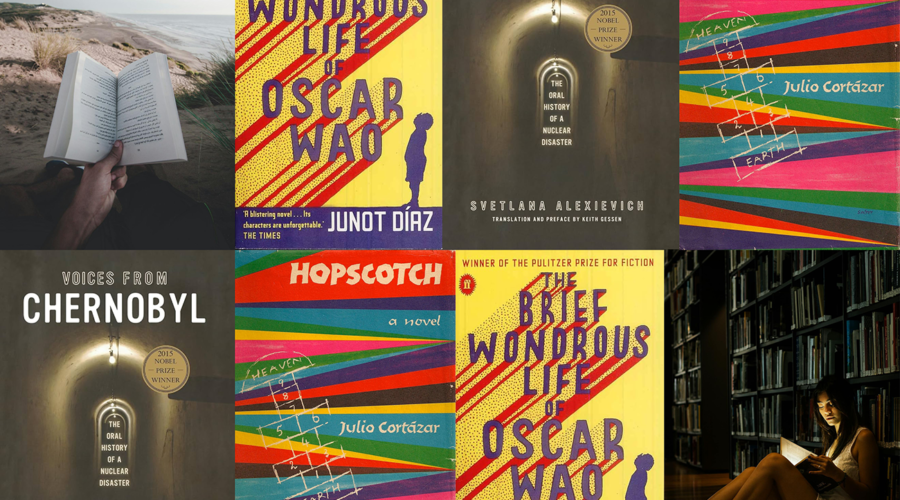With devastating realities, unique perspectives, challenging narrative structures and rich language, these three authors featured this month have grabbed the attention of millions of readers and critics around the world. Their stories have been internationally acclaimed for the brilliance that can be found in every word.
Voices from Chernobyl, Svetlana Alexievich
Non-fiction
Published: 1997
Pages: 253
Author’s nationality: Belarusian
The feelings of the people involved in one of the greatest environmental disasters in history emerge in every line of this story, which reconstructs the aftermath of the Chernobyl disaster.
The process of creating Voices from Chernobyl was a slow one — years of conversations, research and travel to the affected areas and relocation sites. Later, Svetlana Alexievich transcribed each interview to provide a foundation for her work as a writer. Not all of the interviews were included in the book, but all were present in the essence of the book.
It has been translated into more than 20 languages, but in her country, it was banned for many years and only available illegally. Because of the strong criticism in her books, Alexievich has a tense relationship with the Belarusian government, where the catastrophe contaminated 23 percent of the territory and wiped out 485 villages, 70 of which were buried forever.
Alexievich received the Nobel Prize for Literature in 2015.
Who’d like this?
All readers who want to learn more about the Chernobyl tragedy and also read a rigorous work of journalism and storytelling.
Voices from Chernobyl is the result of more than a decade of research by Belarusian journalist Svetlana Alexievich. She interviewed residents, scientists, soldiers, psychologists, politicians, relatives of the dead, firemen, doctors, physicists, liquidators. She brings together forty monologues of the tragedy after consulting with more than five hundred people.
Quotes
- “Chernobyl is like the war of all wars. There’s nowhere to hide. Not underground, not underwater, not in the air.”
- “Is there anything more frightening than people?”
Readers say
- “Not only did I get schooled, this book has changed my life. I cried so hard… This book will change you,” says an Amazon user.
- “I am a big fan of Svetlana and this book just made me realize one more time how important it is to learn from our history. All the pain, all the lies and all the love described so intimate in this book,” says an Amazon user.
The Brief Wondrous Life of Oscar Wao, Junot Díaz
Novel
Published: 2007
Pages: 352
Author’s nationality: Dominican-American
Oscar is haunted by a family curse, or so he thinks. The young Dominican-American nerd searches for his identity, love and how to fit into society while dealing with a complex family.
This novel, which combines elements of magical realism and comedy, has two narrative lines: Oscar’s present in New Jersey with the challenges and rejections in his search, and the family, social and political history in the Dominican Republic.
Junot Díaz tackles issues such as violence, sexuality, identity, personal struggle and love with sincerity and a fresh look. In addition, with his distinctive narrative style he also examines the immigrant experience, as well as the challenges of belonging to two different cultures.
Díaz received the Pulitzer Prize for Fiction in 2008.
Who’d like this?
At the time, a group of critics named this novel as the best of the 21st century to date. If you want to read an excellent, well-crafted story, this book is for you. Junot Díaz’s prose and irreverent, humorous tone resonates with readers, making it worthy of several literary awards including the Pulitzer Prize.
Quotes
- “It’s never the changes we want that change everything.”
- “Nothing more exhilarating … than saving yourself by the simple act of waking.”
Readers say
- “For the first time in my life I’ve finished a book and, immediately, I re-read the same book,” says an Amazon user.
- “Real literature, words, not images. An author with his own voice, like no one else,” says an Amazon user.
Hopscotch, Julio Cortázar
Novel
Published: 1963
Pages: 576
Author’s nationality: Argentine
With Hopscotch, Julio Cortázar wrote what is considered one of the most influential and avant-garde works of the 20th century, which explores loneliness, love and the meaning of life. The story follows Horacio Oliveira, an Argentinean living in Paris on an unstoppable affective and existential quest.
With this work, Cortázar challenges traditional narrative conventions, exploring non-linear structures where the reader can follow different paths through the direction board that suggests multiple orders in which to read the chapters.
Although some writers have been exploring this narrative form in recent years, Cortázar was a pioneer for his time in challenging the reader with these narrative techniques, multiple points of view and wordplay.
Cortázar received the Médici Award in 1974.
Who’d like this?
If you want to enter the mind of a writer ahead of his time, Cortázar is for you.
Hopscotch invites readers to actively participate in this experimental and innovative approach that offers different paths, bringing the reader and the writer into a close relationship.
Quotes
- “I am tormented by your love because I cannot not use it as a bridge because a bridge cannot be supported by just one side.”
- “If you fall, I’ll pick you up, if not, I will lay down with you.”
Readers say
- “The concept of hopscotch is practical, but Julio Cortázar’s book, Hopscotch, is anything but practical — it is profound. Some of the characters in the story understand the idea to play, most do not,” says an Amazon user.
- “This was a brilliant idea and even though the book is over 50 years old, I felt it could have been written today,” says an Amazon user.
Image credits: anouar olh and Luriko Yamaguchi

